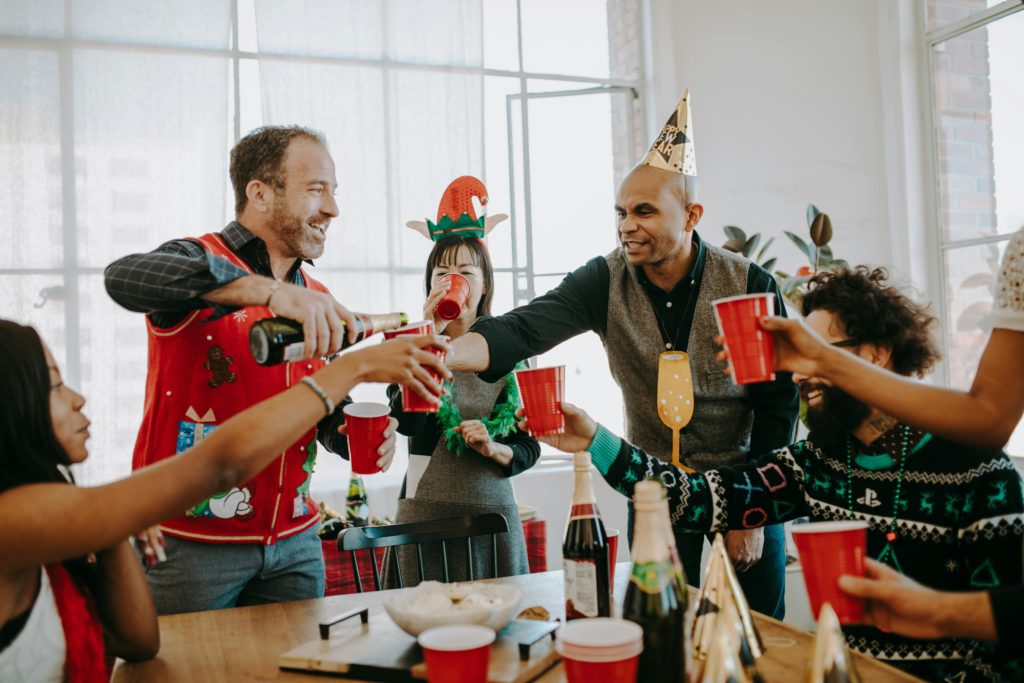
By David Bomark, Research Fellow
Department of Social Policy, Sociology and Criminology, University of Birmingham
One of my favourite Christmases was not spent with my family, as I would normally do, but was instead spent with friends. This was the first time I did not go home as I would usually do, but as my friend worked as a nurse and had been scheduled to work over Christmas that year, a few friends and I decided to spend it with her, in between her shifts. It was great!
Since then, I have spent many Christmases doing something else than spending it with family. One Christmas I visited a friend who, unfortunately, did not have the best relationship to his family, so we ate (too much) Christmas food and chocolates together and watched dumb Christmas movies instead. We had a great time!
Another Christmas I spent alone in Barcelona, walking down the Ramblas and Barceloneta Beach in weather that Britain only experiences during those few days in July! But let me be clear: while I was alone, I was not lonely. I just wanted to do something else for a change, as I know every detail of what a Christmas at home with my parents and siblings would be like, feel like, and taste like. I wanted to experience something else for my Christmas that year.
And I am not alone in this, as people are increasingly celebrating Christmas in non-traditional manners. Doing ‘Friendsmas’ instead of the traditional Christmas celebrations is on the rise, which is spending Christmas with friends rather than family (although it can also mean catching up with friends in the run-up to Christmas, apparently).
Perhaps spending Christmas, or any other important holiday, with friends instead of your family would be unthinkable a few decades ago, but it is increasingly seen as an acceptable alternative. How did we get here?
The sociology of ‘Friendsmas’
From a sociological point of view, modernity has enabled Friendsmas as an acceptable event, and there are two things that I want to highlight here. The first one is how friendships has increasingly become more important in people’s lives (Pahl, 2002; Spencer and Pahl, 2006). Nancy (1991) describes this in terms of favouring experienced kinship over structural kinship, such as family and the clan, and Maffesoli (2016) describes this as “neo-tribalist” as friendships can provide the same emotional bond that is often associated with family.
The second change that modernity brought is the individualisation of society. This change is about how we understand ourselves in relation to others. Previously, our sense of self and identity would come from the collective or community around you.
These days we are instead encouraged, or perhaps forced, to actively become who we are. This means that there is a greater focus on individual choice. This does not mean that people are becoming more egotistic, just that the way people view themselves in relation to others has changed. For example, before people might have started volunteering for the soup kitchen organised by their church, while now people might volunteer with a soup kitchen that aligns with their personal beliefs and values instead.
With this in mind, it is not hard to see why Friendsmas is becoming more popular. As friendships play the same role as family played in the past, spending Christmas is about spending it with people you like. Spending Christmas with friends then serve the same function as the more traditional Christmas with family. This also gives people an opportunity to define who they are and the way they want to live their life, which is important in an individualised world, as some people instead choose to volunteer on Christmas day.
The value of traditions
It is a valid question to ask what place family and traditions have in a more individualised society. My answer is: we do not need to worry. While friendships are increasing in importance, they are a complement to family (Hull and Ortyl, 2019), and do not replace it. The idea that traditions are fixed and eternal is simply not true, as they are always evolving.
In Scotland, Hogmanay (new year’s celebrations) was long the favoured winter holiday celebration with Christmas day only becoming a public holiday in 1958 for the Scots. In Japan, a country that does not usually celebrate Christmas, big buckets of KFC chicken have become the traditional Christmas feast. Perhaps Friendsmas will become a tradition that our grandchildren will rebel against, even!
So, embrace you having a choice, whether that is spending Christmas with your family or with friends! That being said, if you are spending Christmas alone against your will, please do know that there are support available to you.
References
Hull, K.E. and Ortyl, T.A. (2019) ‘Conventional and Cutting-Edge: Definitions of Family in LGBT Communities’, Sexuality Research and Social Policy, 16(1), pp. 31–43. Available at: https://doi.org/10.1007/s13178-018-0324-2.
Maffesoli, M. (2016) ‘From society to tribal communities’, The Sociological Review, 64(4), pp. 739–747. Available at: https://doi.org/10.1111/1467-954x.12434.
Nancy, J.-L. (1991) The inoperative community. Minneapolis, MN: University of Minnesota Press (Theory and history of literature, v. 76).
Pahl, R. (2002) ‘Towards a more significant sociology of friendship’, European Journal of Sociology / Archives Européennes de Sociologie / Europäisches Archiv für Soziologie, 43(3), pp. 410–423. Available at: https://doi.org/10.1017/s0003975602001169.
Spencer, L. and Pahl, R.E. (2006) Rethinking friendship: hidden solidarities today. Princeton, N.J: Princeton University Press.
Tannen, D. (2016) ‘When Friends Are “Like Family”’, Well, The New York Times, 25 March. Available at: https://well.blogs.nytimes.com/2016/03/25/when-friends-are-family/ (Accessed: 4 August 2020).
-
- Read more about David Bomark
- Back to Social Sciences Birmingham
The views and opinions expressed in this article are those of the author and do not necessarily reflect the official policy or position of the University of Birmingham.
